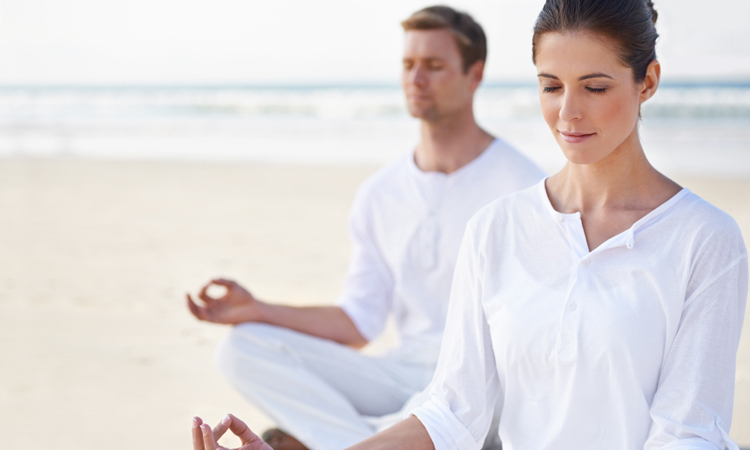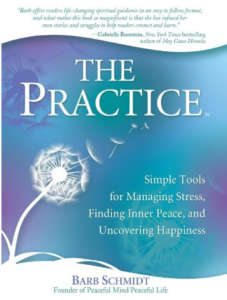
Many of us search for answers outside ourselves. While I think it’s great to look to spiritual and other teachers for inspiration, when it is all said and done, I agree with Barb Schmidt who says true peace of mind comes from accepting, embracing, and loving who we are. But how do you do that? It starts with a daily practice of mindfulness, which Barb Schmidt explains beautifully in her book The Practice: Simple Tools for Managing Stress, Finding Inner Peace, and Uncovering Happiness.

by Barb Schmidt
In search of happiness and peace of mind herself, Barb attended hundreds of seminars with spiritual teachers. She then spent 30 years assimilating many texts and traditions, and practicing what she had learned. Along the way, Barb learned how difficult and painful it can be to sit still with one’s thoughts, many of which are negative. I think anyone who has ever meditated (or practiced another form of mindfulness) can relate.
Barb used her extensive background to create a set of practical tools for developing mindfulness, which she calls The Practice. Amidst a three-part framework of Waking Up, Living Present, and Letting Go, The Practice is a quick and simple, but profound method.
To give you an example, here is an excerpt from The Practice. I believe it can help you quell that stream of negative thoughts and, ultimately, develop patience, gratitude, and compassion for yourself and others.
The Art of Noticing Without Judgment
By Barb Schmidt
We cannot change what happened during the day, but our minds often try to rewrite the ending by thinking about how it should have or could have gone differently. We sometimes go to sleep just raked with guilt, pain, stress, anger, or suffering: Why did I do this? Why did this happen to me? I should have done this. I could have done that. Why did they treat me this way? I feel so guilty for saying those negative things. I’m so angry with her/him! This is not right, what happened to me!
But really, what does this do for us? It actually puts us into an agitated, unsettled place just before sleep. Can you see the absurdity in stressing ourselves out before bed? Here we are, especially after a hard day, thinking, Oh good, the day is over and I can finally end it by going to sleep, but then the mind ruminates over what happened, and there is no way we are getting to sleep; it is impossible. We can only find peace when we are able to let the day go. I know this sounds easier said than done, but little by little, with practice, we become able to leave the day in the day, knowing we did the best we could.
The beauty of life is that is repeats itself. Even though we cannot change what happened on any particular day, chances are we will probably have another opportunity to try again in a similar situation. So we leave whatever it was in that day, but with the awareness and knowledge that we will most likely have another opportunity. Then when that opportunity presents itself, we will make the connection: Oh, this is where I have the opportunity to try this out a little bit differently and see what happens. For example, if I am looking at my day and I see a part where I was impatient with my daughter, I can reflect on the reasons for my impatience: Oh, yes, I was trying to make dinner and something was about to burn, but then the phone rang at the same time my daughter asked me a question, and I snapped at her and said, “Go ask your father!”
When I reflect on this, I am not blaming or chastising myself for my impatience or for being angry with my daughter for interrupting me. I am just acknowledging that I was impatient; in that simple acknowledgment, the new action comes. I now see that next time I could just let my daughter know I would need a few moments before I could respond to her, unless it was an emergency. Phone calls can always go to voice mail if I have to attend to something on the stovetop. In this way, I can see how by Living Present, in the moment, a different response could be beneficial to both my loved ones and myself.
Many of us can relate to being pulled in many directions during the moments of our day. For example, during Reflection, you may notice that you did not handle something as well as you would have liked. Again, this is not about making excuses; it is, however, about acknowledging those factors that may have contributed to your inability to handle matters the way you would have liked—factors such as not getting enough sleep, skipping breakfast, or putting too much pressure and stress on yourself.
Noticing interactions like this is how you begin to tap into your inner wisdom and knowledge. This gives you the perfect opportunity to make an intention to handle something differently next time or to make a change if necessary. You become aware or, as the Buddha said, awake.
QUESTIONS FOR REFLECTION:
When it comes to Reflection, some people have no difficulty visualizing the events of the day and spending a thoughtful moment or two on the highs and the lows. Others prefer prompts to jog their memories and help them focus their thoughts. I have had many people during my workshops ask me for sample questions, so if the latter is your preference, the following are some questions you can use when performing your nightly review. When responding to the questions, just observe your answers without judgment. These questions are intended as examples to help you acknowledge and release your day:
- Did I give my full attention to the people in my life?
- Was I present for them? Was I patient with them?
- How was my interaction with my family and friends?
- How was my interaction with my coworkers and acquaintances?
- Did I make eye contact with people?
- Did I listen to what others had to say?
- Did I use The Practice in my day? How did it help?
- Did I turn to my Sacred Mantra for support?
- What went well today?

Rose Caiola
Inspired. Rewired.
Excerpted with permission from The Practice: Simple Tools for Managing Stress, Finding Inner Peace, and Uncovering Happiness, Health Communications, Inc., 2014.
Click here to find out more about Rose’s thoughts on wellbeing and health
Post Disclaimer
This content is for informational purposes only and does not constitute medical advice. Please consult a healthcare professional for any medical concerns.

